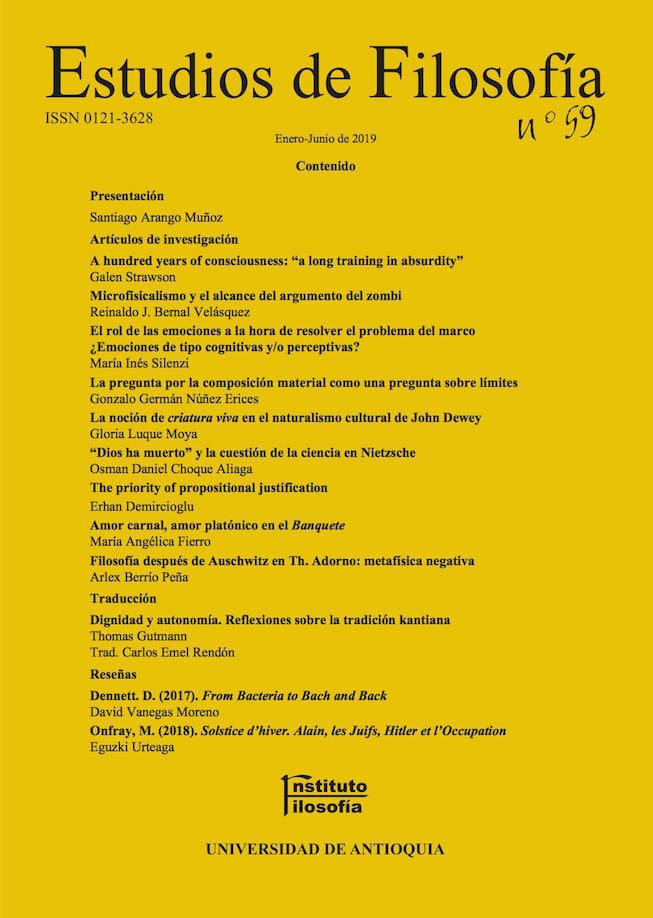The priority of Propositional Justification
DOI:
https://doi.org/10.17533/udea.ef.n59a08Keywords:
epistemic justification, propositional justification, doxastic justification, the epistemic basing relation, John TurriAbstract
Turri argues against what he calls an “orthodox” view of the relationship between propositional and doxastic justification, according to which (Basis) it is sufficient for S to be doxastically justified in believing p that p is propositionally justified for S in virtue of having reason(s) R and S believes p on the basis of R. According to Turri, (Basis) is false and hence the orthodox view is wrong. Turri offers “an alternative proposal,” the definitive thesis is that the subject’s intellectual abilities explain why a given proposition, p, is justified for her, and argues that, contra the orthodoxy, this proposal leads to explaining propositional justification in terms of doxastic justification rather than vice versa. In this paper, I argue for the following claims: (i) There are good reasons to think that Turri misidentifies “the orthodox view” and his objection thereby misfires, (ii) Even if we assume that Turri’s identification of the orthodox view is correct, his counter-examples to that view are far from being decisive, and (iii) Turri’s own proposal is not “an alternative” to the orthodox view but can be accommodated by it.
Downloads
References
Block, N. (1990). Can the mind change the world?. In G. Boolos (Ed.). Meaning and Method: Essays in Honor of Hilary Putnam, Cambridge: Cambridge University Press.
Feldman, R. (?). Epistemology. Upper Saddle River. NJ: Prentice Hall.
Firth, R. (1978). Are epistemic concepts reducible to ethical concepts? In A. Goldman & J. Kim (Eds.), Values and Morals, Dordrecht: Reidel Publishing Company.
Foley, R. (1984). Epistemic luck and the purely epistemic. American Philosophical Quarterly, 21 (2), 113-124.
Goldman, A. (1967). A causal theory of knowing. The Journal of Philosophy, 64 (12), 357-372.
Kim, J. (1988). Explanatory realism, causal realism, and explanatory exclusion. Midwest Studies in Philosophy XII, 225-239.
Klein, P. (2007). Human knowledge and the infinite progress of reasoning. Philosophical Studies, 134 (1), 1-17.
Korcz, K. (2000). The causal-doxastic theory of the basing relation. Canadian Journal of Philosophy, 30 (4), 525-550.
Kvanvig, J. (2003). Propositionalism and the perspectival character of justification. American Philosophical Quarterly, 40 (1), 3-18.
Leite, A. (2004). On justifying and being justified. Philosophical Issues, 14, 219-253.
Melis, G. (2017). The intertwinement of propositional and doxastic justification. Australasian Journal of Philosophy. Online version: http://dx.doi.org/10.1080/00048402.2017.1342097.
Moser, P. (1984). A defense of epistemic intuitionism. Metaphilosophy, 15 (3), 196-209.
Mumford, S. (1998). Dispositions. Routledge Encyclopedia of Philosophy, www.rep.routledge.com.
Pollock, J. & J. Cruz. (1999). Contemporary theories of knowledge. New York: Rowman and Littlefield.
Silva, P. (2015). On doxastic justification and properly basing one’s beliefs. Erkenntnis, 80 (5), 945-955.
Smithies, D. (2012). Moore’s paradox and the accessibility of justification. Philosophy and Phenomenological Research, 85 (2), 273-300.
Turri, J. (2009). An infinitist account of doxastic justification. Dialectica, 63 (2), 209-218.
Turri, J. (2010). On the relationship between propositional and doxastic justification. Philosophy and Phenomenological Research, 80 (2), 312-326.
Vahid, H. (2016). A dispositional analysis of propositional and doxastic justification. Philosophical Studies, 173 (11), 3133-3152.
Published
How to Cite
Issue
Section
Categories
License
Copyright (c) 2019 Erhan Demircioglu

This work is licensed under a Creative Commons Attribution-NonCommercial-ShareAlike 4.0 International License.
Authors who publish with this journal agree to the following terms:
1. The Author retains copyright in the Work, where the term "Work" shall include all digital objects that may result in subsequent electronic publication or distribution.
2. Upon acceptance of the Work, the author shall grant to the Publisher the right of first publication of the Work.
3. The Author shall grant to the Publisher a nonexclusive perpetual right and license to publish, archive, and make accessible the Work in whole or in part in all forms of media now or hereafter known under a Creative Commons Attribution-NoCommercia-ShareAlike (CC BY-NC-SA 4.0), or its equivalent, which, for the avoidance of doubt, allows others to copy, distribute, and transmit the Work under the following conditions: (a) Attribution: Other users must attribute the Work in the manner specified by the author as indicated on the journal Web site;(b) Noncommercial: Other users (including Publisher) may not use this Work for commercial purposes;
4. The Author is able to enter into separate, additional contractual arrangements for the nonexclusive distribution of the journal's published version of the Work (e.g., post it to an institutional repository or publish it in a book), as long as there is provided in the document an acknowledgement of its initial publication in this journal;
5. Authors are permitted, and Estudios de Filosofía promotes, to post online the preprint manuscript of the Work in institutional repositories or on their Websites prior to and during the submission process, as it can lead to productive exchanges, as well as earlier and greater citation of published work (see The Effect of Open Access). Any such posting made before acceptance and publication of the Work is expected be updated upon publication to include a reference to the Estudios de Filosofía's assigned URL to the Article and its final published version in Estudios de Filosofía.















